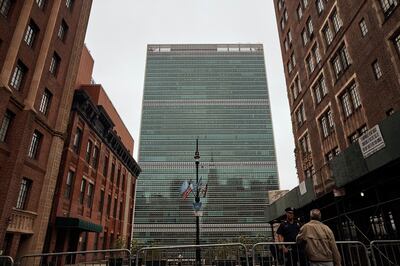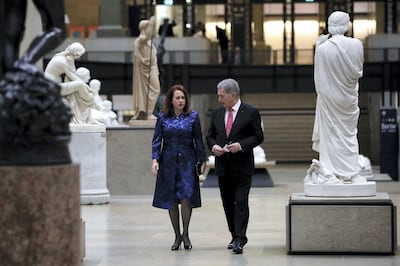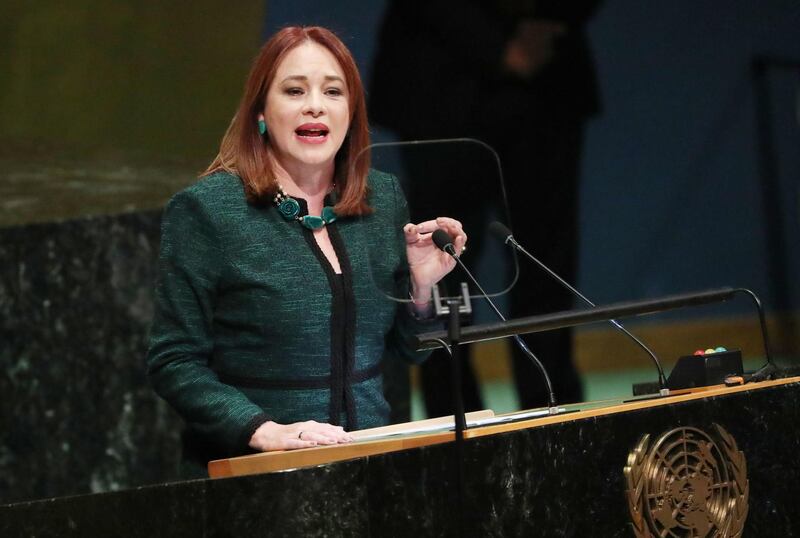The view from Maria Fernanda Espinosa Garces’s office windows, on a bright but bitterly cold January afternoon, is dominated by the sun that glints magnificently on New York’s East River.
The mostly low-slung industrial buildings of Long Island City across the water are a marked contrast to the skyscrapers of Manhattan where the UN’s own glass and stone headquarters building remains a defining landmark on a 7.2-hectare plot classed as international territory. It is a spectacle that would cost a lot to buy.
For Ms Espinosa Garces, however, the one-year presidency of the United Nations is not something that could be the subject of a transaction. Although the upper levels of the UN tower’s 39 storeys offer vistas that a real estate developer would salivate at, the 54-year-old Ecuadoran incumbent of one of the UN’s highest positions is based on the lowly second floor.
Elected by the UN’s 193 members last summer, she took up her position at the heart of global diplomacy in September. Only four months later, the feeling that she has a lot to prove does not seem far from her mind.
“What I can tell you is that no one knocks on your door and says: ‘Here it is – a Cabinet position or a scholarship to study’. You have to earn it and for us women, the struggle, I would say, and the stakes, are higher because we have to show that we are fit for purpose.
"People expect more of you because you are a woman", she says, shortly after spending an hour with Palestinian leader Mahmoud Abbas, who was in New York this week to take the chairmanship of the G77 group of developing nations.
Although the subject of Middle East peace was a dominant thought, it barely registered during the Palestinian president’s visit. The meeting reflected part of the UN president’s job of listening and representing all of the world body’s members.
Although she describes the lack of a solution in Palestine as “a long-standing debt” she says she spoke to Mr Abbas only of issues pertinent to all the G77’s members.
And while Ms Espinosa Garces’s path to the top has already been taken, the journey seems to be just beginning.

Tomorrow, she will arrive in Islamabad to start an official visit to Pakistan. It is a country filled with the prospect of hope offered by Prime Minister Imran Khan but with a legacy of political failure compounded by corruption and violence that seems never far away. From there, she will head to Oman for a two-day visit.
Ms Espinosa Garces visited India weeks before taking office as president of the UN General Assembly last year. Her trip to Pakistan’s South Asian rival seems fitting of the multilateralist agenda of common goals that she has put at the heart of her leadership.
Commending Pakistan’s contribution to UN peacekeeping – it has the third highest number of troops in the field – Ms Espinosa Garces will spend five days in the country. Before a UN Women conference in New York in March, where female leaders will be invited over a week to share their experiences and seek to boost representation at the highest levels of power, the UN president said it is a message she will take to Pakistan and share in her meetings with Mr Khan and other top officials.
The issue rose to prominence in recent years with the campaign in northern Pakistan by Malala Yousafzai, now 21 but once a teenage activist for female education in the country, and the winner of the 2014 Nobel Peace Prize. “I am very interested in looking at the plans and the progress made on women’s rights and gender parity,” Ms Espinosa Garces says. “I will bring that agenda to my bilateral meetings, of course.”
Prior to her current post at the UN, Ms Espinosa Garces served twice as Ecuador’s foreign minister after leaving academia. She is only the fourth woman to hold the post of president in 73 years of the General Assembly and the first from the Latin American and Caribbean region.
Vijaya Lakshmi Pandit (India) in 1953, Angie Brooks (Liberia) in 1969, and Haya Rashed Al Khalifa (Bahrain) in 2006, preceded her.
________________
Read more:
Palestinian leader looks to UN for relevance with peace process moribund
As Europe tries to save Iran deal, US sanctions push faces test
Saeb Erekat: Trump administration is trying to divide Palestinian leadership
________________
Ms Espinosa Garces has spent more than 20 years in politics. Although she became foreign minister for the first time in 2007 perhaps nowhere was the gender divide so obvious as when she served as Ecuador’s minister of defence between 2012 and 2014.
She speaks of meetings where she was the only woman in the room. “Almost all of them. I had to face that,” she says, suggesting that the problem has not gone away.
“Even in the diplomatic world, there is still a lot of machismo and discrimination because there are very low numbers of women ambassadors, or in foreign service. It is very much a male-dominated culture.”
It is not only a question of numbers. A better measure of progress, she says, would be an increase in the number of women in executive positions of power. At the moment, only 4 per cent of world leaders are women.
But the challenges she faces as president are not confined to gender. A major feature of her tenure has been the UN’s Global Compact for Migration, an international plan to improve the world’s handling of people outside their birth country.
The 34-page non-binding agreement aims to support safe and orderly migration, reduce people trafficking and ensure basic human rights for all migrants. It is the first intergovernmental negotiated accord to cover all dimensions of international migration.
It was adopted after a major summit in Morocco last month but its effect had already been blunted by an outspoken rejection of its aims from the United States, Australia and Hungary.
A lengthy statement from the US Mission to the United Nations condemning the pact just days before the Marrakech Summit brought countries together, seemed designed to embarrass the UN’s proposals.

Ms Espinosa Garces does not have to look far from her office for a reminder that the US administration of President Donald Trump refused to join the migration plan, claiming that it would damage American sovereignty despite it not having the force of law.
Visible across the water on Long Island City is a giant clock that counts down the number of days left – 732 as of Thursday – of Mr Trump’s first term.
Although not mentioning the US president or administration by name, it is not difficult to establish who Ms Espinosa Garces may be thinking of when she thinks of how the UN’s migration effort was undermined.
“There was a counter campaign, a misleading campaign regarding the compact. I think that is a reflection of something that is happening – an alternative reality that is being created by social media,” she says, admitting that the UN’s messaging on migration has to be more effective in future.
Co-operation between Mexico, El Salvador and Honduras, based on the UN compact’s guidelines, while human caravans head for Mexico and the US border, shows its relevance, she says. “They have agreed to use the compact, under UN auspices. This is concrete.”





